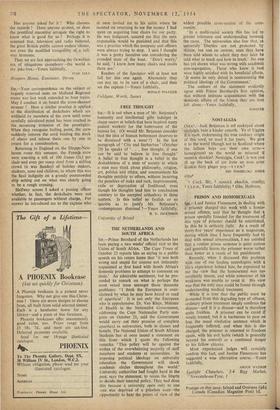FREE THOUGHT
SIR,—It is sad when a man of Mr. Betjeman's humanity and intellectual gifts indulges in cheap sneers at beliefs that have inspired many patient workers for the betterment of the human lot. (Or would Mr. Betjcman consider that the idea of human betterment deserves to be dismissed with a sneer ?) In the last paragraph of 'City and Surburban ' (October 29) he speaks of . . free thought, if one can be said to believe in free thought.' A belief in free thought is a belief in the desirableness of a state of society in which a man may think about philosophy, religion, art, politics and ethics, and communicate his thoughts publicly to others, without incurring the penalties of stake and rack, imprisonment, exile or deprivation of livelihood, even though his thoughts lead him to conclusions contrary to the accepted orthodoxy in these matters. Is this belief so foolish or so ignoble as to justify Mr. Betjeman's contemptuous dismissal '7—Yours faithfully, University of Bristol H. D, DICKINSON


































 Previous page
Previous page